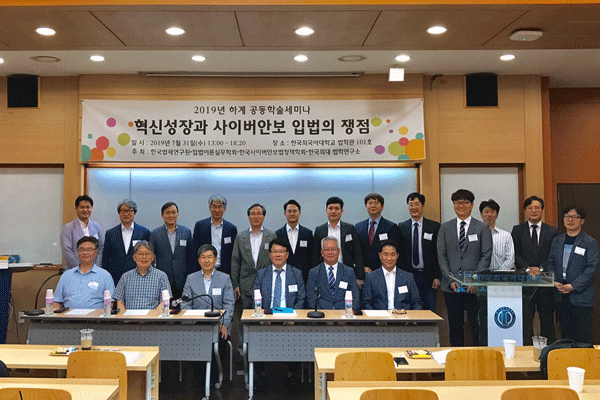News
KLRI Held Joint Academic Conference with Korea Society for Legislative Theory and Practice Inc.

- Date 2019-07-31 View 812
The Korea Legislation Research Institute (President: Rhee Ik Hyeon) held a joint academic conference under the theme of “Innovation Growth and Cyber Legislation Issues” in conjunction with the Korea Society for Legislative Theory and Practice Inc., the Korean Cyber Security Law & Policy Association, and the Law Research Institute of Hankuk University of Foreign Studies at the Hankuk University of Foreign Studies from 1 pm on July 31 (Wednesday).
This academic conference was prepared to discuss legislative issues in Korea, Germany, EU and China in response to electronic infringement.
The conference consisted of two sessions and was attended by more than 70 experts including President Rhee of the KLRI, Chairperson Kim Ki Pyo of the Korea Society for Legislative Theory and Practice Inc., Chairperson of Kim Jae Kwang of the Korean Cyber Security Law & Policy Association, and Director Jeon Hak Sun of the Law Research Institute of Hankuk University of Foreign Studies at the Hankuk University of Foreign Studies.
In Session I, presentations and debates were held for Legal Issues of Administrative Action on Cyber Security Legislation in Germany and the EU, followed by presentations and debates on “Legal Issues of Administrative Action on Cyber Security Legislation in China” and “Legislative Assessment on National Cyber Security Legislation in the Republic of Korea” in Session II.
Na Chae Joon, Park Se Hun, Bae Gun Yee, and Lee Jae Hoon, members of the KLRI and Sun Ji Won, Ph. D. of the Korea Information Society Development Institute participated in the presentations and debates.
In the comprehensive discussion session, Kim Jong Chul, professor of the Yonsei University, Kim Ji Hoon, director of the KLRI, and Park Young Woo, Ph. D. of the Korea Internet and Security Agency discussed on “Implications and Future Tasks of Advanced Foreign Cyber Security Legislation.”
President Rhee of the KLRI said "There is growing interest in cyber security and needs for research discussion due to concerns about the outflow of national core technologies to foreign countries. This academic conference is intended to draw implications by individually and comprehensively reviewing cases of major countries such as Germany and the European Union."